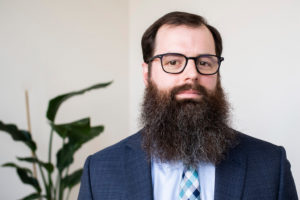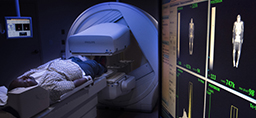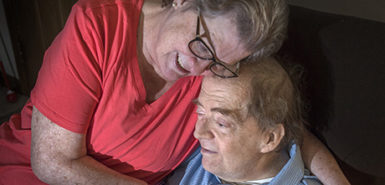
Shortly after he was born, Jameson Jibben, 7, developed unique health symptoms that seemed to stump his parents and doctors.
Limited mobility. Developmental delays. Little to no hair on his head. No eyelashes or eyebrows.
His symptoms were similar to those of Marley Berthoud, 7, who at birth showed neurological deficits that initially baffled her health care team.
In both instances, medical geneticists at Spectrum Health used genetic sequencing to analyze the children’s entire genetic code—billions of nucleotides—and uncover a mutation in the ODC1 gene.
It ultimately pointed to a rare condition, Bachmann-Bupp syndrome, which helped geneticists and doctors identify therapies for both children.
These are two shining examples of Spectrum Health geneticists and genetic counselors conducting testing and diagnosis to help uncover underlying genetic causes of patient conditions.
The genetics team at Spectrum Health provides risk assessments for family members, as well as support and resources.
At the core of their work, the team helps families pin down answers—and they’re changing lives with cutting-edge developments in this exciting realm of medicine.
“The field of genetics is advancing at a rapid pace,” Caleb Bupp, MD, division chief for medical genetics at Spectrum Health, said.
The Health Beat team met up with Dr. Bupp recently to talk about his team’s work—and learn more about what’s on the horizon in medical genetics.
How has the field of genetics advanced in the past few years?
“We can do things that we were never able to before,” Dr. Bupp said. “And we are finding things that we never knew existed.”
In the past, genetic testing had typically been difficult for patients to access.
“We didn’t know what we were looking for a lot of the time,” Dr. Bupp said. “We were very reactive. Something was going on and we were trying to figure it out. We’re being more proactive now, finding things and making changes to give us a better future.”
How do patients connect with Spectrum Health medical geneticists?
Many patients—adults and children of all ages—are connected with Spectrum Health geneticists because they don’t know exactly what is going on with their health.
“We see folks who have a known genetics condition, or a suspicion of a condition,” Dr. Bupp said. “We sit down with them, understand what is going on and walk with them on the journey to hopefully find some answers.”
Patients can receive a referral to the Spectrum Health medical genetics program, or they can contact the program directly.
What are some developments in the identification and treatment of rare conditions?
“When it comes to rare conditions, the world has gotten a lot smaller,” Dr. Bupp said. “We used to not know what was going on in the rest of the world. And now when we find things, we can connect with people and understand something much faster than we could before.”
In some cases, there’s one patient here or there, and then a patient somewhere else with similar symptoms.
Dr. Bupp’s team can put multiple cases together and look for genetic evidence that points to possible answers. This helps pinpoint treatments and leads to next steps.
“We found the ability to do more faster and to give patients access to the personalized care that they need and deserve,” he said.
What surprises patients most about genetic research?
“People are always surprised at how much we can do with cheek swabs versus blood draws,” Dr. Bupp said. “It’s all about DNA with genetic testing. You can get everything you need from a spit kit or a swab, and it has gotten much easier to do genetic testing these days.”
What does the process of genetic testing look like?
Dr. Bupp said the team takes a blood draw or cheek swab from the patient, and then sends samples to the lab for analysis.
“DNA is extracted and isolated,” he said. “And then we go to work on that DNA looking for genetic differences.”
He said all tests are a little different.
“We’re always learning new things, and whatever you say today can change tomorrow,” he said.
Dr. Bupp’s team connects frequently with patients who are just learning they’ve had a health condition for years. And sometimes, doctors simply never knew the condition existed.
“We always wonder if tomorrow is going to be the day,” he said. “Where you find something and it changes everything.”
Is there a database where all the data from tests is stored?
“Every lab is different, but there is a real move towards data sharing,” Dr. Bupp said. “We all can learn from each other, and what we find can help other people.”
He said there are large de-identified databases where genetic data is shared and monitored. Researchers can connect with counterparts in other parts of the world, for instance, and lend a helping hand for the greater good.
How long does genetic testing take?
Typically, it can take weeks to months in clinic.
“The one- or two-day turnarounds happen more frequently in the hospital with highly acute conditions,” Dr. Bupp said. “Our genetic information doesn’t change. So if it is what it is today, if we wait a week or a month, it’s typically going to be OK.”
Dr. Bupp said he’s proud of his team’s hard work in providing genetic testing that serves patients in the best possible way.
How does personalized medicine fit into genetics?
Advancements in knowledge and technology ultimately lead to better treatments for each patient seeking answers.
“We are all genetically unique, and we now can prove it,” Dr. Bupp said. “We can find things in people’s genetics that will give us the specifics on who they are. And when we know that we can start to target treatment, therapies and interventions.”
Dr. Bupp said his genetics team helps determine not just what care to provide, but why and when to provide that care.
“It helps us take that next step in giving that individualized approach that patients really need,” he said.
What makes you most proud of your work?
“Who we are,” Dr. Bupp said. “The people who are a part of this team make it what it is today.”
It’s gratifying to see how these advancements in medicine are changing lives, he said.
“It’s a tough journey for many,” Dr. Bupp said. “They come to a genetics clinic looking for answers.
“We bring the compassion and empathy to help patients understand what’s going on and where things are headed.”
 /a>
/a>
 /a>
/a>
 /a>
/a>